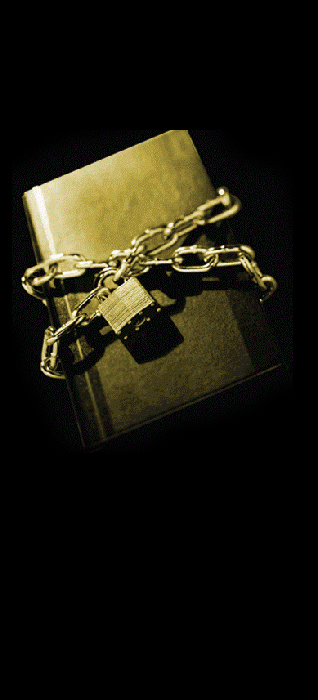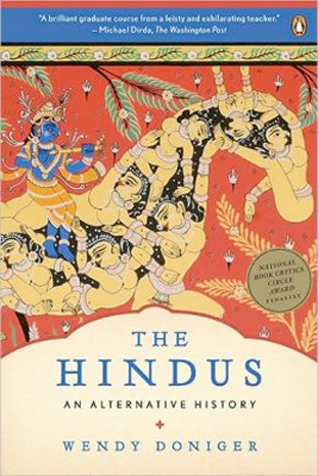Books
Banned in India
WENDY DONIGER
Last month a retired Hindu schoolteacher named Dinanath Batra, who had brought a lawsuit against me and Penguin Books, India, succeeded in getting my book, “The Hindus: An Alternative History,” withdrawn from publication in India.
The book, the Indian court agreed, was a violation of India’s blasphemy law, which makes it a crime to offend the sensibilities of a religious person.
Within hours I was receiving hundreds of emails from colleagues, students, readers, high school friends and even complete strangers -- in the United States, India and beyond -- commiserating with me in my dark hour.
But their sympathy, while appreciated, was also wasted: I was in high spirits.
I have devoted my entire academic career, going back to the 1960s, to the interpretation of Hinduism and Indian society, and I have long been inured to the vilification of my books by a narrow band of narrow-minded Hindus.
Their voices had drowned out those of the broader, more liberal parts of Indian society; it reminded me of William Butler Yeats’s line: “The best lack all conviction, while the worst / Are full of passionate intensity.”
What is new, and heartening, this time is that the best are suddenly full of passionate intensity. The dormant liberal conscience of India was awakened by the stunning blow to freedom of speech that had been dealt by my publisher in giving in to the demands of the claimants, agreeing to take the book out of circulation and pulp all remaining copies.
I think the ugliness of the word “pulp” is what struck a nerve, conjuring up memories of “Fahrenheit 451” and Germany in the 1930s. The outrage had been pent up for many years, as other books, films, paintings and sculptures were forced out of circulation by a mounting wave of censorship.
My case was simply the last straw, in part because of its timing, just when many in India had begun to view with horror the likelihood that the elections in May will put into power Narendra Modi, a member of the ultra-right wing of the Hindu nationalist Bharatiya Janata Party (BJP).
If Mr. Batra’s intention was to keep people from reading the book, it certainly backfired.
In India, not a single copy was destroyed (the publisher had only a few copies in stock, and those in bookstores quickly sold out), and e-books circulate freely. You cannot ban a book in the age of the Internet. Its sales rank on Amazon has been in single-digit heaven. “Banned in Boston” is a selling label.
Attention has now shifted, rightly, to the broader problems posed by the Indian blasphemy law. My case has helped highlight the extent to which Hindu fundamentalists (Hindutva-vadis, those who champion “Hindutva,” or “Hindu-ness”) now dominate the political discourse in India.
Two objections to the book cited in the lawsuit reveal something about the Hindutva mentality.
First, the suit objects “that the aforesaid book is written with Christian Missionary Zeal.” This caused great hilarity among my friends and family, since I grew up in a Jewish family in Great Neck, New York, USA.
But when I foolishly decided to set the matter straight -- “Hey,” I wrote to an accuser, “I’m Jewish” -- I was hit with a barrage of poisonous anti-Semitism. One correspondent wrote: “Hi. I recently came across your book on hindus. Where you try to humiliate us. I don’t know much about jews. Based on your work, I think jews are evil. So Hitler was probably correct in killing all jews in Germany. Bye.”
It’s hard to have a religious dialogue with someone who begins the conversation like that. I was doing better in my role as a Christian missionary.
But there is a bitter irony in this mischaracterization of my religion, since Christian missionaries are actually a part of the problem.
The Victorian Protestant British scorned Hinduism’s polytheism, erotic sculptures, spirited mockery of its own gods and earthy mythology as filthy paganism. They also preferred the texts created and perpetuated by a small, upper-caste male elite, and regarded as beneath contempt the vast oral and vernacular literatures enriched and animated by the voices of women and lower castes. It is this latter, “alternative” Hinduism that my book celebrates throughout Indian history.
Many of the Hindu elite who worked closely with the British caught the prejudices of their masters. In the 19th century, those Hindus lifted up other aspects of Hinduism -- its philosophy, its tradition of meditation -- that were more palatable to European tastes and made them into a new, sanitized brand of Hinduism, often referred to as Sanatana Dharma, “the Eternal Law.”
That’s the Hinduism that Hindutva-vadis are defending, while they deny the one that the Christian missionaries hated and that I love and write about -- the pluralistic, open-ended, endlessly imaginative, often satirical Hinduism. The Hindutva-vadis are the ones who are attacking Hinduism; I am defending it against them.
The Victorian factor also accounts for the Hindutva antipathy to sex. (Here it is not irrelevant that the Indian Supreme Court recently reinstated an 1861 law criminalizing homosexuality.) The lawsuit objects that my “focus in approaching Hindu Scriptures has been sexual in orientation.”
In my defense, I can tell you there is a lot of sex in Hinduism, and therefore a lot of puritanism in Hindutva; where there are lions, there are jackals. The poems and songs that imagine the god as lover, like the exquisite statues of goddesses, are a vital part of the religion of those Hindus who did not cave under the pressure of colonial scorn.
But I must apologize for what may amount to false advertising on my behalf by Mr. Batra, who pronounced my book “filthy and dirty.” Readers who bought a copy in hope of finding such passages will be, I fear, disappointed. My book, “The Hindus”, isn’t about sex at all. It’s about religion, which is much hotter than sex.
Wendy Doniger is a Professor of the History of Religions at the University of Chicago and the author of “The Hindus: An Alternative History.”
[Courtesy: The New York Times]
March 7, 2014
Conversation about this article
1: Harpreet Singh Makkar (Brampton, Ontario, Canada), March 07, 2014, 8:14 AM.
Got my copy from Amazon yesterday. Thanks to Mr. Batra for making a 2009 book popular all over again in 2014!
2: R Singh (Canada), March 07, 2014, 12:04 PM.
I have read this book, and found it a very refreshing change from the current picture in vogue. That is how we knew it, that which provided the compost for thoughts to germinate, until this neo-fascist version was invented, that is being imposed on people, a version that brooks no other viewpoint, nor has any place for new thought for all is now tied to the infallibility of the Vedas.
3: Baljit Singh Pelia (Los Angeles, California, U.S.A.), March 07, 2014, 1:53 PM.
Hindu & Hinduism was a derogatory term -- derived from a word for 'thief' -- originated by the elitist Persian, Arabic and Islamic vernacular to describe the inhabitants of the Indian sub-continent who worshiped objects, animals and practiced paganistic rituals and enigmatic superstitious beliefs. Please view this video-http://youtu.be/kjkHI6PtrEY An evolutionary indigenous reformist movement was initiated by Guru Nanak and the Nine Gurus who followed him, over two centuries and a half, culminating in a universal spiritual guide (Guru Granth Sahib) as well as the temporal governance doctrine (Khalsa). All deep spiritual renderings were deliberated upon and carefully preserved by inclusion in the Guru Granth. Thanks to the British, hindutva and Hindu nationalism has come into play since after the divisive partition of 1947 just as Islamic fundamentalism has taken root in the northwest. The underlying objective, besides division, being the ease with which such fascist movements can be easily inflamed or crushed and it facilitates the ulterior objective of proliferation of Christian evangelism through convent schools and institutions. This was the sole objective of the retreating British in creating these sects and the resulting chaos that has burdened the nation with instability and animosity amongst its diverse population that could have flourished in the secular freedom everyone seeks and Sikhism espouses.
4: Sunny Grewal (Abbotsford, British Columbia, Canada), March 07, 2014, 2:36 PM.
I've always been curious about Hindutva and its opposition to the role of sexuality in Hinduism. How the heck do these people come to terms with ancient temples, palaces and caves filled with erotic art of Hindu deities? I mean, they sure as heck aren't going anywhere, they are out in plain sight for everyone to see.
5: Baldev Singh (Bradford, United Kingdom), March 07, 2014, 6:38 PM.
The more the Hindus become extreme and dangerous to others, the more the Sikhs will take on this challenge! The Muslim 'purists' tried to ban 'The Satanic Verses' only a while ago and it has made its author the most famous writer on Earth and the book the biggest selling work of fiction! Banning books will not hide what Hindutva really is, you can see it and smell it across India because they have only turned this breathtakingly beautiful land into a political and literal toilet!
6: Dr Birinder Singh Ahluwalia (Toronto, Ontario, Canada), March 08, 2014, 8:52 AM.
Every respectable democracy and it's institutions (especially judiciary) allow freedom of press and expression (unless a publication purports to invoke or incite hate, for example) to be one of their hallmark pillars to advance interests of an intelligent society. I know India is an intelligent society but yet is not a respectable democracy which I think Indians should be working towards (to establish "a respectable democracy") - and develop institutions such as an impartial judiciary which interprets the law fairly and without prejudice. We in the diaspora should assist India and Indians in all ways to achieve these objectives ... I do hope change comes to India sooner rather than later.
7: Kaala Singh (Punjab), March 08, 2014, 11:26 PM.
These guys will ban anything that tells the reality but will not stop making fun of others.
8: Kaala Singh (Punjab), March 09, 2014, 3:16 AM.
Dr. Ahluwalia, to your optimism, I can only say "Amen". But all signs here point to a downward slide.
9: Sunny Grewal (Abbotsford, British Columbia, Canada), March 09, 2014, 3:32 PM.
@7 Kaala Singh ji: Well put. The new Punjabi film "Kuom de Heere" has been banned in India on the grounds that it could cause communal disharmony. The logic behind the ban of the film is quite similar to the ban behind this book: Hindus do not like the accurate recording of history and what it has to say of them. Furthermore, apparently there is no communal disharmony when they use Bollywood as a medium to insult and misrepresent Sikhs.





